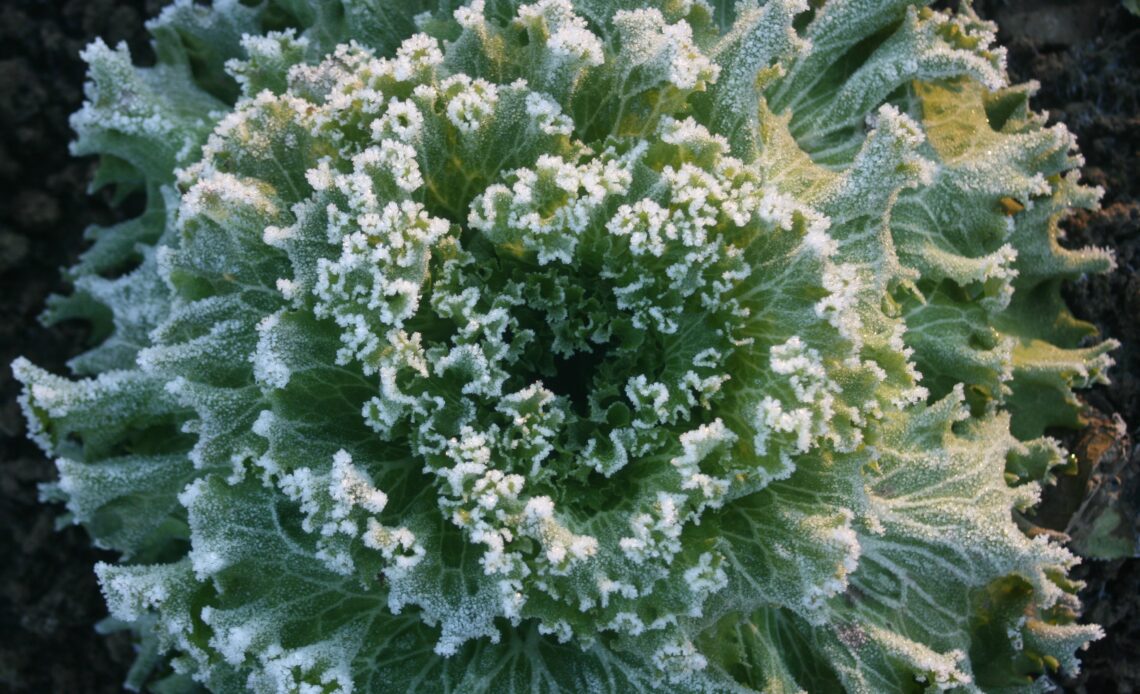
Introduction
During the summertime, we want to reflect on the ecological condition of our local environments, Europe, and our planet as a whole. Addressing this multifaceted and complex subject, we want to give a voice to people who are making a tangible impact through their innovative ideas, work, and research.
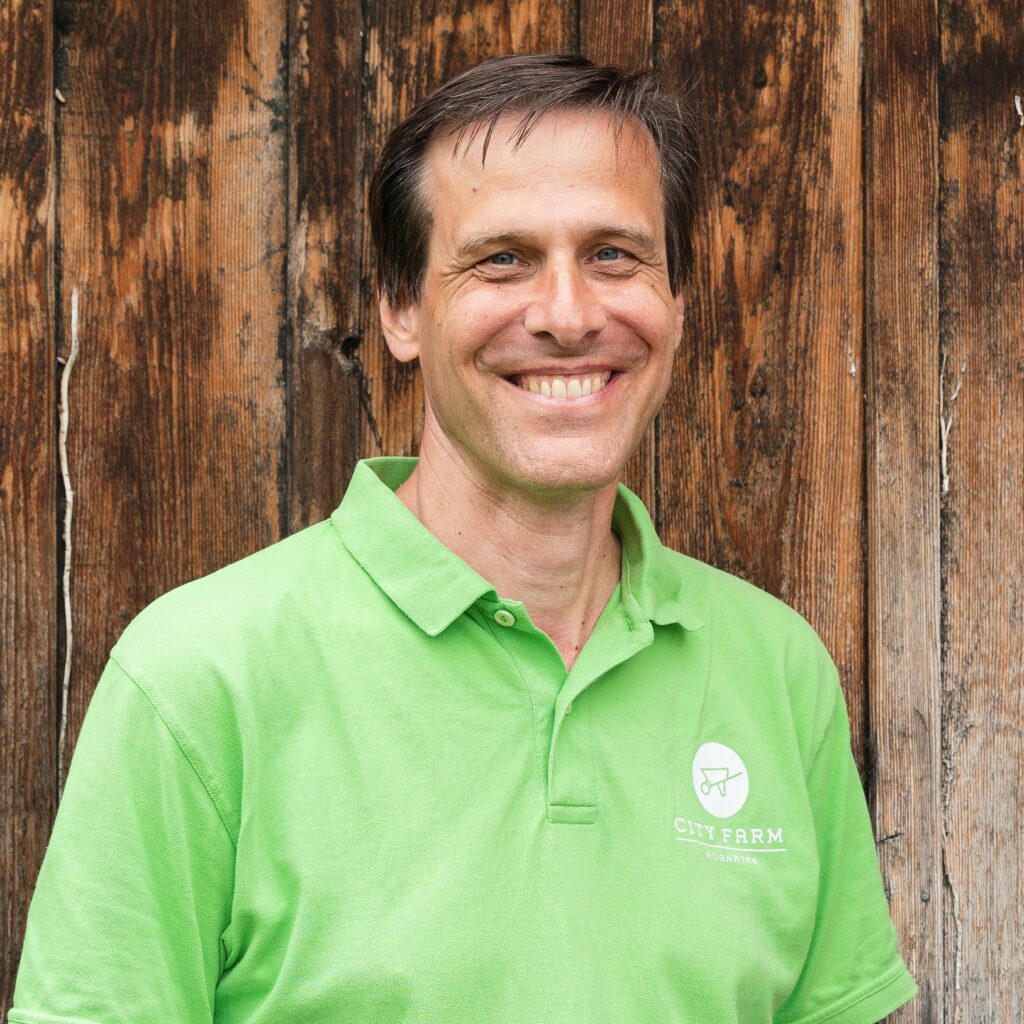
In this article, we explore the world of vegetable cultivation with author and vegetable and gardening enthusiast DI Wolfgang Palme1, who has been leading the vegetable cultivation department at the Horticultural Collage and Research Institute in Vienna-Schönbrunn. Over the years, Palme has initiated various projects, such as the City Farm in Vienna, which integrates scientific research, practical gardening, educational initiatives, and training programs.
Palme demonstrates that cultivating vegetables does not always require a science lab or complex biochemical methods. Instead, he advocates for simpler, more accessible approaches as a promising foundation for future innovations. Through his work, he shows that practical and straightforward methods can be remarkably effective, inspiring ecological consciousness and sustainable gardening practices. Join us as we delve into Wolfgang Palme’s insights and discover how his innovative, yet uncomplicated techniques are contributing to the future of vegetable cultivation.
Listen to the podcast “Winter Vegetable Gardening” with Wolfgang Palme.
Towards an Alternative Vegetable Production for the Future: Growing Fresh Food Sustainably
17 JULY 2024 | by DI Wolfgang Palme
We’ve all seen the images in the media: scientists in their white coats standing in high-tech laboratories holding Petri dishes in their hands. Crispr/Cas, protoplast fusion and CMS hybrids – modern plant breeding seems to have become unthinkable without specialised biotechnological methods. In practical agriculture, too, all hopes are pinned on a technological future. This is known as Smart Farming, Digital Farming, or simply Agriculture 4.0. Intensive vegetable cultivation has long since arrived at this stage. Soilless, computer-controlled growing systems in high-tech greenhouses deliver maximum yields of fruit vegetables all year round. We expect vertical farming in an urban environment to provide new innovative impetus. In their sterile, LED-lit production shelves, the lettuces no longer need soil or sun.
Zinsenhof experimental station
Open-air beds, simple polytunnels, an ageing greenhouse: against the background outlined above, the facilities at the Zinsenhof experimental station at the Horticultural College and Research Institute – Schönbrunn in Lower Austria’s Mostviertel region, seem rather backward. For us, however, this weakness has turned into a strength. We want to develop alternative production methods for domestic vegetable cultivation in an applied, practice-orientated way, which can serve as an alternative to resource- and energy-guzzling high technologies. Because they are about a return to a new simplicity, they are of course not for investors, but exclusively for “food artisans”.
Efficient instead of just productive
The calculations of the Viennese agricultural historian Fridolin Krausmann provided important considerations for our research strategy, as he was able to prove that although so-called modern agriculture is more productive, it is less energy-efficient than it was more than 150 years ago2. Productivity only considers output in the form of increased yields and acreage. Efficiency, on the other hand, scrutinizes the energy input-output ratio. And here we are worse off than ever. Although we are harvesting maximum yields, we are using unprecedented amounts of resources and energy.
We are therefore convinced that there is only one way to produce fresh vegetables in a truly resource-efficient and sustainable way: we must utilise biological potential, design genuine agro-ecosystems and find a completely new unity of soil – plant – human. This approach to production is called bio-intensive and allows for high-yielding harvests without exploiting the soil.
Practical examples
Does that sound a bit theoretical or even pathetic to you? It is possible. The “agricultural turnaround” has to start in the mind, but if it is not completely practical, nothing is gained. That’s why we have developed very specific examples at the Zinsenhof that literally bring these concepts down to earth.
- Winter fresh vegetable cultivation: more than 17 years of practical cultivation trials have shown that a very wide range of lettuces, herbs and other leafy and tuberous vegetables are much more frost-resistant than we ever thought they would be. They can be grown specifically for an unheated winter harvest and provide abundant yield.
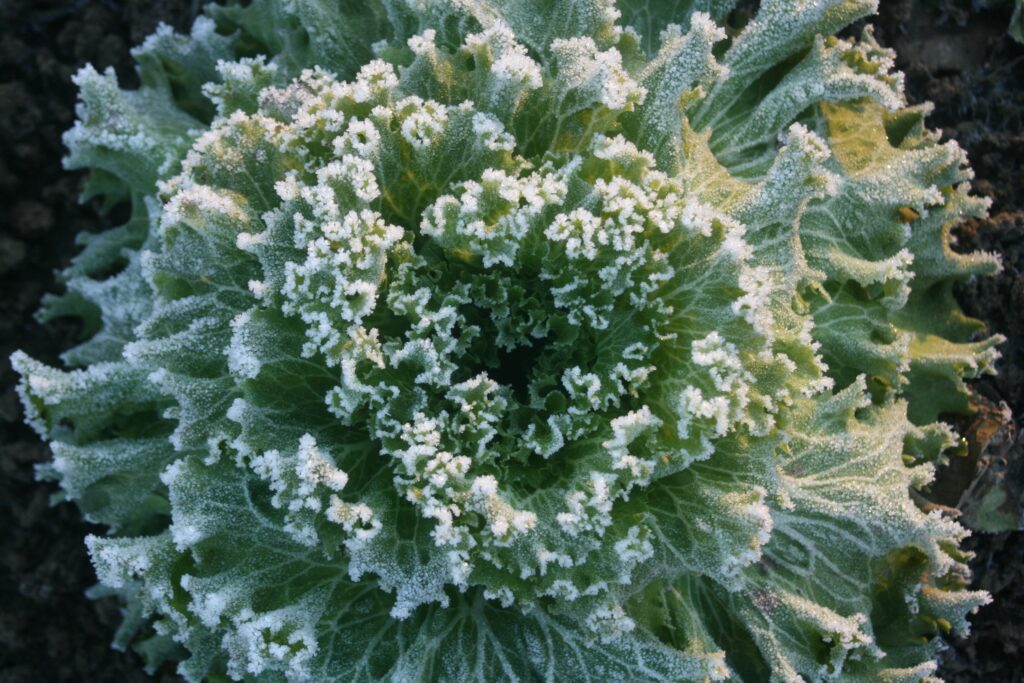
The fact that many fresh vegetables are more frost-hardy than they were supposed to be is the basis of a very targeted, heating-free fresh winter harvest.
(C) Wolfgang Palme
- Low-energy products: in a 10-year research project, we have developed a cultivation method that takes the old gardener’s hot bed concept and translates it into modern polytunnels. It works according to the principle that has brought premature yields to generations of gardeners in the past: the decomposition of organic matter (horse manure, but in our trials also other biomaterials) generates heat that can be used to prolong or prepone the summer season. In this way, tomatoes can be harvested in cold polytunnels from 8 to 10 May, courgettes from the end of April and cucumbers from mid-May.
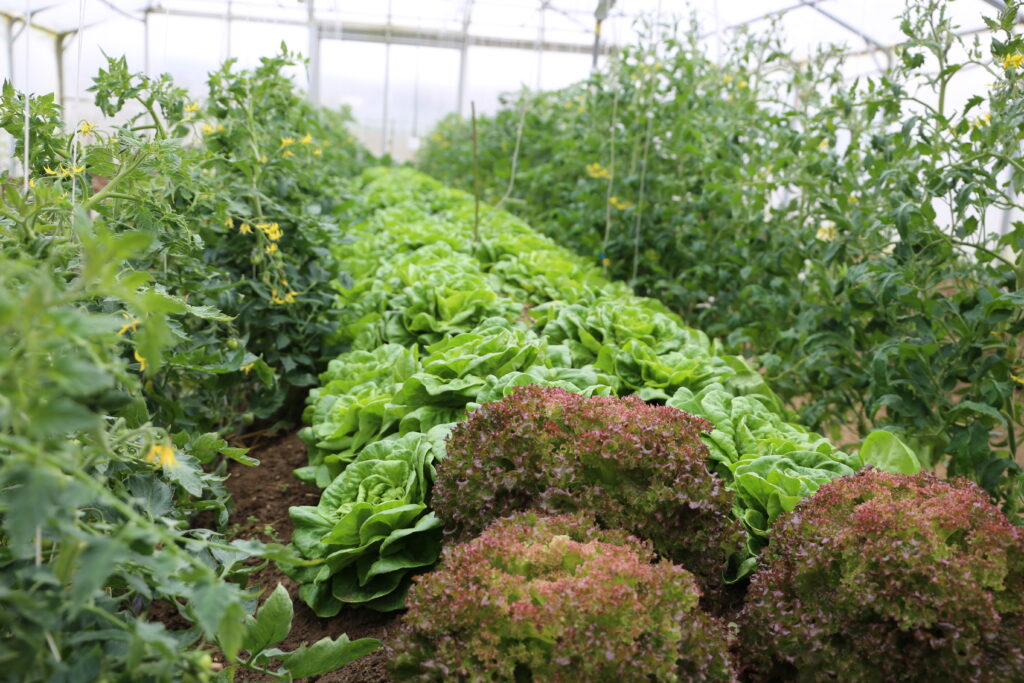
With low-energy systems, fruit vegetables can be harvested up to 6 weeks earlier in cold polytunnels. Just like in the old gardener’s hot beds of the past, the heating effect that occurs during the microbial decomposition of organic matter is utilised.
(C) Wolfgang Palme
- Mobile greenhouse systems: simple, mobile rolling polytunnels on rails offer invaluable advantages for sustainable crop rotation in vegetable growing, counteract soil fatigue and utilise the valuable protected space precisely when the plant really needs it. A prototype of this type has been in place at the Zinsenhof for 10 years.
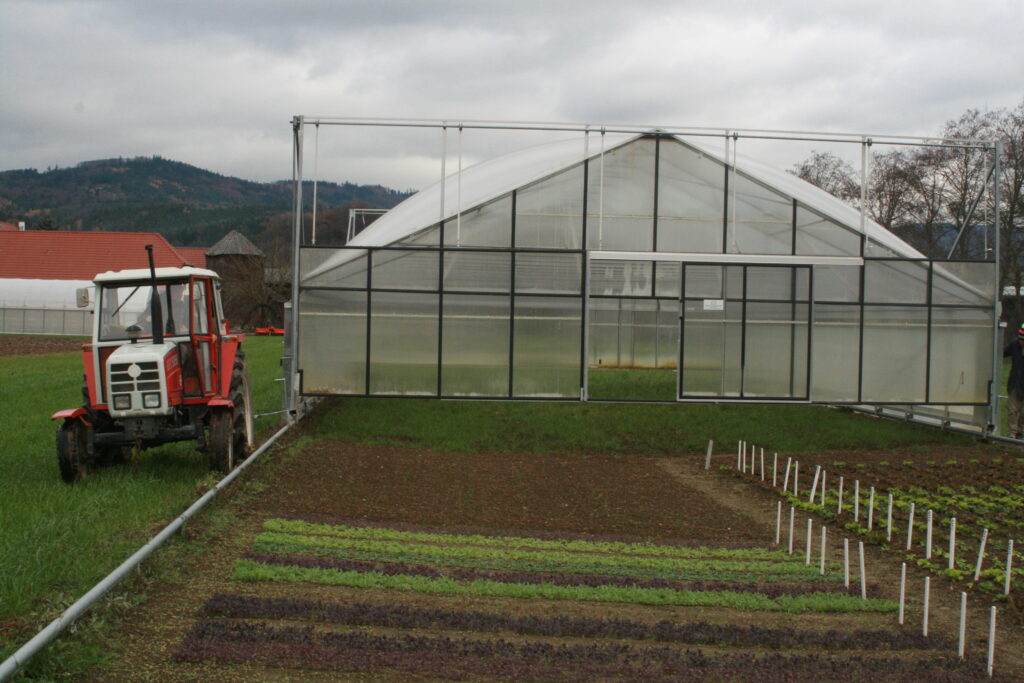
Rolling polytunnels run on rails. They are moved several times a year and are always pulled over existing crops exactly when they actually need the protected space
(C) Wolfgang Palme
In our applied research work over many years of experimentation, we have never ceased to be amazed: biological systems (I mean this quite literally here) function incredibly simply, require a relatively low input of resources and work “for us”. Conversely, if we do not utilise the biological potential of soil and plants, we pay a high – too high – price with resource-guzzling technology, which we can no longer afford individually, as producers, and as a society as a whole from an economic and, above all, ecological point of view.
For me as a convinced Christian, this amazement also means joy, because I recognize the Creator’s handwriting, His ingenious design, but also His generosity, with which He wants to give us an abundance of plant-based food.
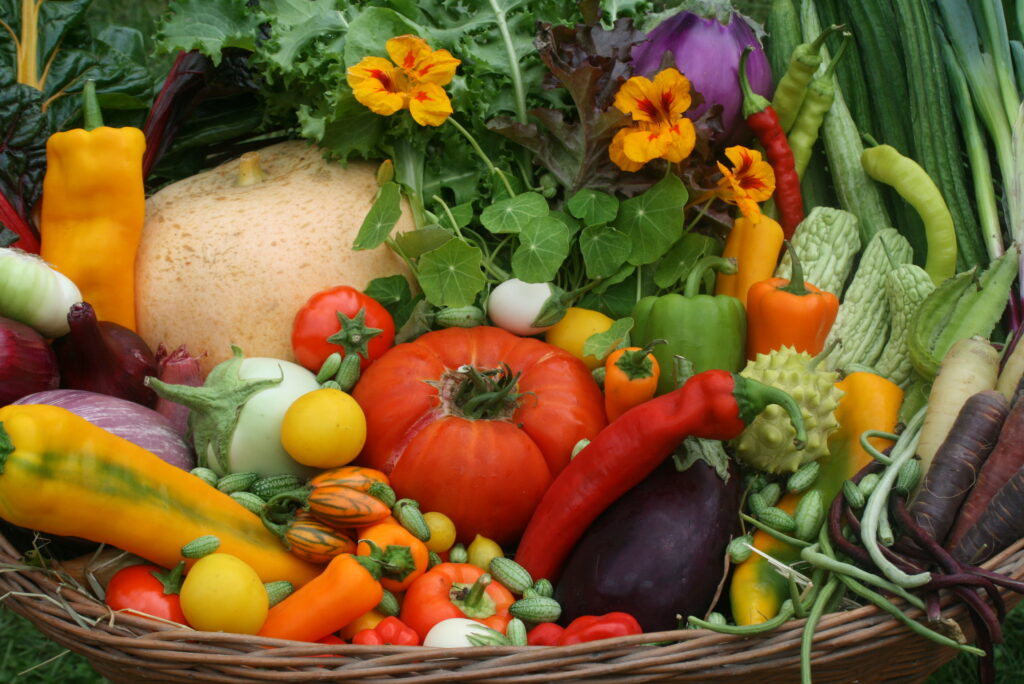
Utilising organic fresh vegetables in all their botanical, seasonal, aesthetic and, not least, culinary diversity forms the basis of a healthy diet and sustainable social care.
(C) Wolfgang Palme
- DI is short for Diplom Ingenieur (Dipl. Ing.). ↩︎
- F. Krausmann, 2004, „Langfristige Veränderung im gesellschaftlichen Umgang mit Natur: Eine sozial-ökologische Perspektive der Agrarmodernisierung“, Habilitationskolloquium, Vienna. ↩︎
Photo Credits: Portrait by Jeff Mangione, featured image and all other images by Wolfgang Palme.

